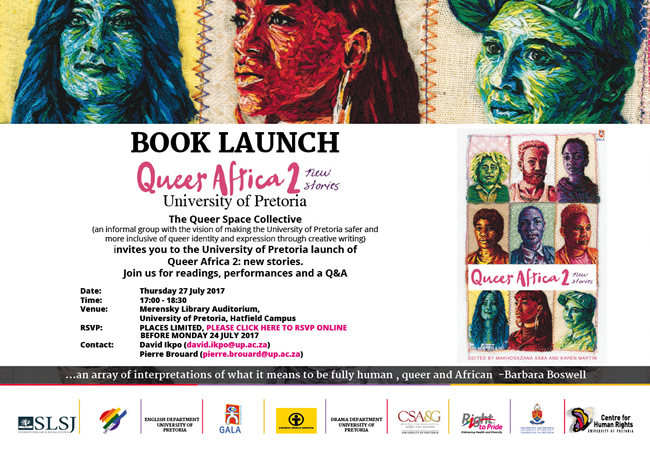The Queer Space Collective (an informal group with the vision of making the University of Pretoria safer and more inclusive of queer identity and expression through creative writing) invites you to the University of Pretoria launch of Queer Africa 2: New Stories. Join us for readings, performances and a Q&A session.
Queer Africa 2: New Stories is a ground breaking collection featuring twenty-six masterpieces from eight countries – Kenya, Nigeria, Rwanda, Sierra Leone, Somalia, South Africa, Uganda, and the United States of America. The plots of all twenty-six stories are separately and skilfully woven to reflect a vast range of human emotions and experiences that abound in the lives of Africans of all shades and colour at home and abroad who own the queer identity.
Date: Thursday 27 July 2017
Time: 17:00 - 18:30
Venue: Merensky Library Auditorium, University of Pretoria, Hatfield Campus
RSVP: PLACES LIMITED, PLEASE CLICK HERE TO RSVP ONLINE BEFORE MONDAY 24 JULY 2017
Contact: Mr David Ikpo ( david.ikpo@up.ac.za) / Pierre Brouard ( pierre.brouard@up.ac.za)
The cover art by Danielle Clough is a series of miniature embroidered portraits based on photos of African people who identify as lesbian, gay, bisexual, transgender, intersex and queer (LGBTIQ). Each stitch, each colour a representation of beauty, detail and depth.
For GALA, home to the MaThoko’s Books imprint, Queer Africa 2 represents a further step towards challenging mainstream depictions of sexual and gender diversity. ‘This publication allows readers to recognise the complexities of our lives – our joys and sorrows, our struggles and triumphs. Queer Africa 2 is of vital importance to the work of GALA, as it ensures in both a symbolic and practical way that the narratives of LGBTIQ people are preserved, celebrated and publicly accessible,’ says GALA director Keval Harie.
Queer Africa 2 follows on from the international success of 2013’s Queer Africa: New and Collected Fiction, which won the 26th Lambda Literary Award for the fiction anthology category and was translated into Spanish in the same year. The original anthology is now used to teach literature and queer theory at universities across South Africa.
